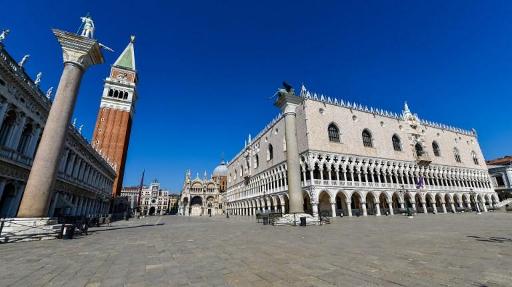Italian Prime Minister Giuseppe Conte said that the country's coronavirus lockdown would "clearly" have to be extended, a move which French officials say they were "very likely" to mimic.
"It is clear that the provisions we have taken, which have shut down the country's business and everyday activities (...) can only be extended after the upcoming deadline," Conte said in an interview with Corriere della Sera.
Conte's statements come ten days into a nation-wide lockdown, initially set to last until 3 April, which authorities imposed to curb the surging rate of infections and hospitalisations linked to the new coronavirus (Covid-19),
The Italian prime minister said that, even after Italy reached the peak of the outbreak, Italians would continue to feel the long-lasting impact of the viral pandemic that has brought life around much of the globe to a screeching halt.
"It is obvious that when we reach the peak and the contagion starts to decrease —at least in percentage (...)— we will not be able to immediately return to life as it was before [the lockdown]," Conte said, adding that the outbreak in Italy would "hopefully" peak "in a few days."
A total of 35,533 cases of coronavirus and 2,978 deaths had been confirmed in Italy on 19 March, according to the latest figures by the World Health Organisation (WHO).
Related News
- The situation in France is 'rapidly' deteriorating
- Belgium in Brief: ‘It’s a crisis, not a holiday'
- Coronavirus: Belgium reaches 1,795 confirmed cases
The army has been mobilised to ramp up production of ventilators as doctors and nurses scramble to treat the estimated 2,000 Covid-19 patients in intensive care needing the life-saving medical devices.
As Conte said that Italy had "avoided system collapse" thanks to the measures, hospital staff have compared the situation to a war zone, with field hospitals set up across cities to ease crowded hospital wards.
"Yesterday we expected to have a change after almost 10 days of this new measure ... but it's still rising," an Italian virologist told CNN.
This week, Italy broke its own record for its deadliest day of the pandemic in less than 72 hours, with Wednesday's 475 deaths beating Monday's 368.
Conte did not provide specific details regarding the length of the lockdown extension.
France set to follow suit as PM declares sanitary state of emergency
The head of France's public health service agency, Santé Publique France, said that it was "very likely" that France would also move to extend a nationwide lockdown.
"It will very likely be necessary to prolong [confinement] in order to sufficiently halt the [spread of the virus]," Geneviève Chêne said in a radio interview on Thursday.
Announced in a televised national address by President Emmanuel Macron on Tuesday, the measures were initially introduced for a 15-day period.
In order to ramp up France's response to what Macron described as a "war" against the virus, the lockdown largely shut down public life in France, emptying streets across the country as well as tourist hotspots in the capital Paris.
The lockdown also imposed stiff restrictions on movement, with citizens only allowed out for "essential reasons," and required to download a certificate to prove it.
Chêne's comments on Wednesday also follow an announcement by Prime Minister Edouard Philippe that the country was declaring a sanitary state of emergency, set to be made official in a matter of days.
The state of emergency would empower Philippe's cabinet to take measures by decree aimed at further curtailing citizen's movement as well as granting him powers to "requisition any goods and services" in order fight against the pandemic, which he called a "sanitary catastrophe."
In France, the first European country to report a Covid-19 infection, the count of coronavirus infections stood at 9,055 as of Wednesday, according to WHO, out of which 3,626 were hospitalised.
On Wednesday, France reported that 89 new deaths now put the country's coronavirus death toll at 264, with officials also reporting an increase of new coronavirus cases of nearly 20% in 24 hours.
Gabriela Galindo
The Brussels Times

